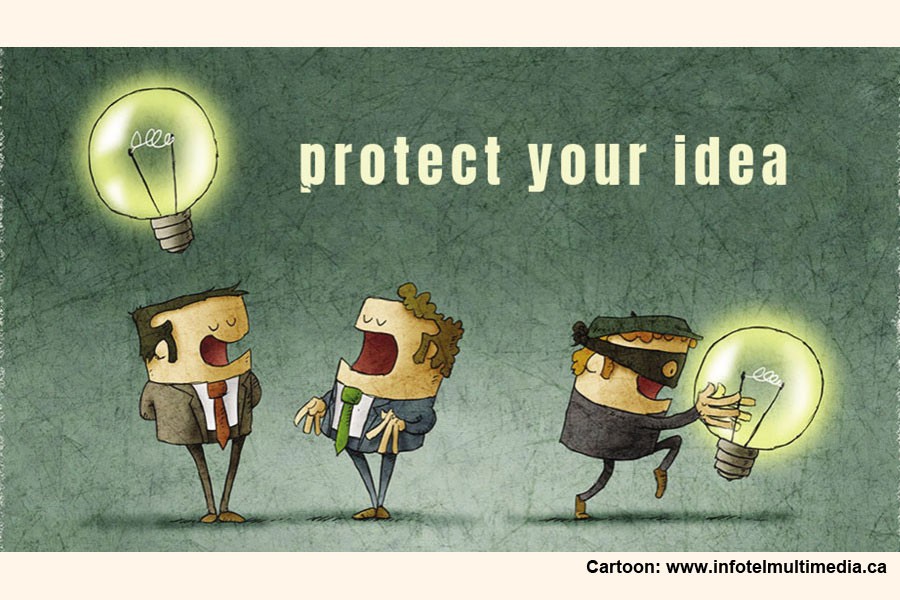
Published :
Updated :

People are more or less aware of the fact that they must protect their movable or immovable properties to exercise their rights on them; however, there are very few who are well aware about protecting their intellectual property (IP). As we are moving up the ladder of development, there is no alternative to realising the fact that protecting one's IP is as important as protecting his/her tangible wealth.
To understand the socio-economic value of Intellectual Property Rights (IPRs), first we need to clear a few confusions which often arise among artists, entrepreneurs, or innovators. Most people overlook the importance of protecting intellectual property under the assumption that IPRs only concern big companies or musicians. Also, they are not aware of the different branches of IPRs that offer protection for different kinds of intellectual creation.
Patent, Trademark, and Copyright are three significant branches of IPR which are affecting the commercial sector every day. In today's business world every company has more intangible assets (e.g. software, mobile apps, trade names, and logos or artistic designs) than tangible ones. Most people when they think of IP, they either believe it's all about protecting tech-related inventions or protecting artistic creations such as music or cinema.
However, things are not like what people think. IPR is the protection of one's creation to gain profit from it. The notion of intellectual property is to encourage individuals to invent/create to ensure economic progress as a whole, in return for monopoly rights over it for a certain period. For example, a patent gives the inventor approximately 16-20 years (varies from nation to nation) exclusive monopoly right over his tech-based invention enabling sole control over the distribution and reproduction of the invention. In Bangladesh, many scientists or inventors have lost the right to claim their invention to profit from that.
A classic example would be Sir Jagdish Chandra Bose. Despite his invention of radio before anyone, he remained unknown to many while Marconi is celebrated worldwide for inventing the first radio. Marconi had the patent first and he remains in history.
Therefore, it should be a common practice to file a patent application at once you have begun to develop ideas of something unique. The Department of Patent, Designs, and Trademark in Bangladesh is the place where you need to go. As many of us are not aware of the indispensable principle of patent law that is, once you disclose your invention to others/the public before filing a patent application, you lose the novelty of your invention which is one of the primary requirements of obtaining a patent.
Copyright, on the other hand, ensures the protection and permissible uses of original works of authorship, including music, photographs, videos, written documents, or any other form of artistic works. Although copyright registration is not mandatory, it is wise to have a copyright registration for your creative work which later can be used as concrete proof in infringement disputes. Unlike other IPRs, copyright law not only ensures injunction or prohibition of further infringement of your work, it also ensures compensation as a remedy.
On the other hand, trademarks are very important for trade and business. Trademark consolidates trade name, logo, slogan, or visual design which particularly helps the consumer to distinguish between the origins of the product. Trademark ensures the goodwill or branding of the business which not only secures customer loyalty, but also helps the business owner to raise funds and other forms of financial investments, or to establish franchise business.
KFC, Coca-Cola, BMW, Apple etc are some of the most renowned trademarks in the global market. A total of 33.1 million trademarks were involved in 124 IPs, according to the World Intellectual Property Organisation (WIPO) database (2015). In 2017 WIPO also asserted that Trademark applications are increasing among low or middle-income countries as more start-ups and business ventures are merging to boost their economy.
In Bangladesh, almost every day a new start-up business is emerging. Over the past few years, we have observed a sudden growth in e-commerce, especially in Facebook based small businesses, which are called f-commerce. However, as an IP practitioner, I have encountered numerous cases where the proprietors are struggling to stop others from copying their business contents such as products, name or logo, photographs, posts etc.
Due to the lack of knowledge regarding IP protection, many small business owners are struggling to make their rightful revenue. On the other hand, many artists i.e., photographers, digital artists, musicians, painters, and writers are under the constant threat of losing their authorship because most of them are unaware of copyright protection.
Ignoring IPR not only affects personal prosperity, it affects a country's economic growth as a whole. By ensuring IPR, Bangladesh can multiply its revenue significantly each year. According to a study by European Observatory in 2013 on Infringements of IPR and data provided by European Patent Office, IPR-driven industries account for about 90 per cent of European Union's (EU) trade with the rest of the world, generating a trade surplus for the EU of EUR 96 billion. It also contributes 42 per cent of the total economy and adds EUR 5.7 trillion worth to GDP each year.
Similarly, in 2016, the U.S Commerce Department released a report showing IP-intensive industries support at least 45 million U.S jobs and contribute more than USD 6 trillion to the country's GDP. Therefore, it doesn't need further explanation why Bangladesh needs to tighten up its IPR.
Dewan Tauhida Akther is an IPR practitioner. antara.iprcc@gmail.com


 For all latest news, follow The Financial Express Google News channel.
For all latest news, follow The Financial Express Google News channel.